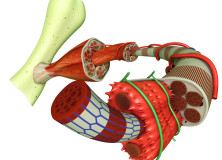Insulin-like growth factor-1 suppresses the Myostatin signaling pathway during myogenic differentiation.

Myogenic differentiation is a complex and well-coordinated process for generating mature skeletal muscle fibers. This event is autocrine/paracrine regulated by growth factors, principally Myostatin (MSTN) and Insulin-like Growth Factor-1 (IGF-1). Myostatin, a member of the transforming growth factor-β superfamily, is a negative regulator of skeletal muscle growth in vertebrates that exerts its inhibitory function by activating Smad transcription factors. In contrast, IGF-1 promotes the differentiation of skeletal myoblasts by activating the PI3K/Akt signaling pathway. This study reports on a novel functional crosstalk between the IGF-1 and MSTN signaling pathways, as mediated through interaction between PI3K/Akt and Smad3. Stimulation of skeletal myoblasts with MSTN resulted in a transient increase in the pSmad3:Smad3 ratio and Smad-dependent transcription. Moreover, MSTN inhibited myod gene expression and myoblast fusion in an Activin receptor-like kinase/Smad3-dependent manner. Preincubation of skeletal myoblasts with IGF-1 blocked MSTN-induced Smad3 activation, promoting myod expression and myoblast differentiation. This inhibitory effect of IGF-1 on the MSTN signaling pathway was dependent on IGF-1 receptor, PI3K, and Akt activities. Finally, immunoprecipitation assay analysis determined that IGF-1 pretreatment increased Akt and Smad3 interaction. These results demonstrate that the IGF-1/PI3K/Akt pathway may inhibit MSTN signaling during myoblast differentiation, providing new insight to existing knowledge on the complex crosstalk between both growth factors.


